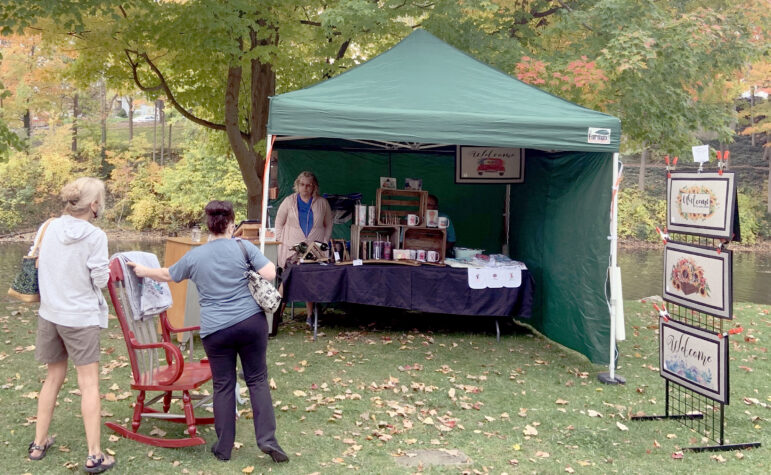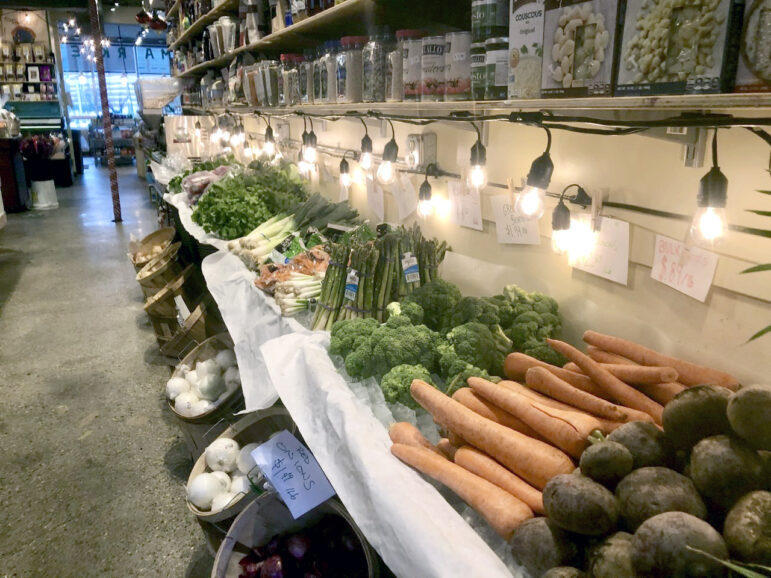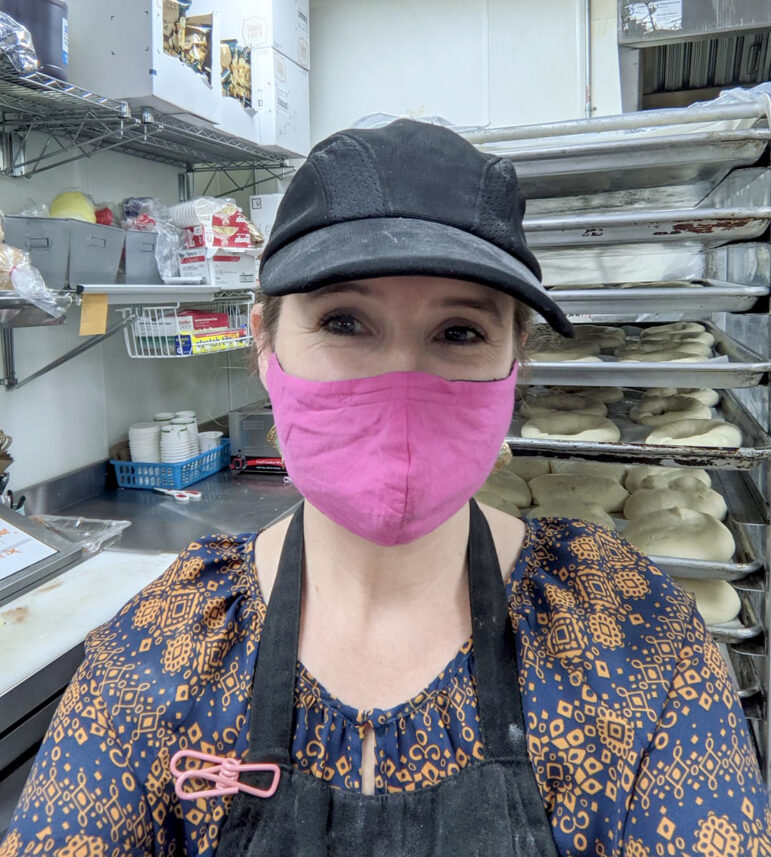
Sarah Peltz
Grand Ledge Chamber of Commerce ended its farmers market season with a Fall Festival on Saturday, Oct. 10. This festival gave small businesses the opportunity to sell products successfully while growing and gaining a customer base.When Bethany Augustine discovered her passion for creating baked goods, she decided to take her creations to her local farmers market, Market on the Grand. After six years of selling at the market, she opened up her own bakery, Flour Child Bakery, in Grand Ledge in 2016.
The mother of three taught herself how to bake bagels, focaccia bread, cookies and croissants. But it was her time at the farmers market that helped her figure out how to market and package her baked goods and develop a customer base.
“I owe all of my success to my time at the farmers market,” Augustine said. “That was my full-time job for those six years. But had I not done that and had I just decided to open up a bakery when no one knows who I am or what I’m about, I don’t think I would have found success especially in tough times like these.”
For Flour Child Bakery and many other local businesses, the local farmers market has become an essential resource for entrepreneurs launching new ventures.
“It can be really helpful to be in an environment where not only are you engaging directly with customers, you can engage with other vendors,” said Julia Kramer, who manages the Allen Farmers Market on Lansing’s east side. “Whether or not they’re doing the same thing as you, you can learn from them and you can create partnerships.”
Kramer said being able to build relationships with and gain the trust of customers is especially important for the businesses that are selling produce. In addition to its weekly market, the Allen Farmers Market also operates an incubator commercial kitchen for small businesses to rent.
Joseph Enerson, the finance and business manager at the Allen Neighborhood Center, said the incubator kitchen is an open space for vendors to create and test products. The commercial kitchen meets health regulations and provides basic equipment that might be too expensive for a small food startup business to afford on its own.
“It can be really difficult to get into the industry, so we offer commercial kitchens that you can rent by the hour,” Enerson said. “So it makes it a lot less risky and a lot easier for people to enter the industry through that kind of set up.”
Growing from nothing
Caley Gunthorpe, owner of Apple Blossom Kombucha Co., said she is grateful for the Allen Neighborhood Center. This community resource allowed the mother and former full-time teacher to start her business while spending more time with her daughter. Gunthorpe said she benefited the most from the incubator kitchen program.
“I really would not be where I am without the help of everyone at the Allen Neighborhood Center,” Gunthorpe said. “Before I got my own space, the Allen incubator kitchen is where I started. I rented space to brew my kombucha in a commercial facility and do all of my bottling, labeling and fermenting there.”
Gunthorpe said the first market she ever sold a bottle of kombucha at was at the Allen Farmers Market.
“Being able to sell at the Allen Farmers Market made me a part of something so much more than I could have hoped,” Gunthorpe said. “The community and relationships you make at the market are unlike any other. Talking and educating people about kombucha is what helped my business thrive.”
Amy Hoyes, executive director of Grand Ledge Chamber of Commerce, said farmers markets are not only beneficial to the vendors, but the customers as well.
“Farmers markets have that personal touch because it’s that person-to-person that you are supporting,” Hoyes said. “Not only do vendors rely on coming there, but we also have customers who go there every Saturday morning to get their eggs and organic meat. I think people would be very upset if we didn’t have it.”

Caroline Miller
Ken Campbell, the owner of Campbell’s Market Basket, said his business only sells farm fresh produce and healthy food to its customers. Campbell said East Lansing never had a fresh market like this one available when he was growing up, prompting Campbell to start his own.Farming and selling local food
Ken Campbell, the owner of Campbell’s Market Basket, said he not only attributes the success of his business to farmers markets but it is also where he found his passion for growing local, healthy food. Campbell’s Market Basket has been selling farm fresh produce and a variety of other foods on 547 E. Grand River Ave., near the MSU Broad Art Museum in East Lansing. The market opened in spring 2019.
“Having a fresh market downtown East Lansing is something we’ve never had growing up,” Campbell said. “I think that especially in this day in age, healthy food and fresh food is super important, so with my past experiences and my past jobs I thought I could kind of help fill in and create that type of market.”
Campbell said he discovered his passion for growing local food after working at a farm in Northern Michigan called Pond Hill. Not long after, he said he started growing his own produce and selling it at a farmers market in Grand Ledge.
“I think that the experience made me feel more comfortable and gave me the know-how and the confidence to start a business,” Campbell said. “Without that, I don’t think I’d be in the same spot.”

Lindsey Hyams
On Thursday, Dec. 3, Kristen Philiotis and Kate Irwin shop at Campbell’s Market Basket for fresh produce. Philiotis and Irwin said they are loyal customers of the East Lansing market.Allen Farmers Market’s Kramer said farmers markets can be beneficial for small businesses that are just getting started regardless if they sell food and produce or something else.
“If you’re part of a farmers market, you get to take advantage of that market as an entity,” Kramer said. “Our farmers market has its own social media presence, its own email list, its own promotional opportunities and partnerships. So your business and your brand are getting promoted throughout all those different networks that you may or may not have had access to otherwise.”
Extra help
Kramer also said the Allen Neighborhood Center and its farmers market was able to help those who were experiencing food insecurity due to COVID-19 with its Supplemental Nutrition Assistance Program, or SNAP. Kramer said the program is similar to food stamps, allowing participants to buy items at the farmers market.
“The government decided to, at least in Michigan, have everyone receive the maximum amount of SNAP every month basically throughout this entire year since March and the people who fund the Double Up Food Bucks program decided to get rid of the cap on that program,” Kramer said. “So we have people come to the market, take $100 out of their account and get $200 to spend at the farmers market, which no one could do before.”
Flour Child Bakery also made giving back to its community a priority when COVID-19 first hit the country.
“We closed the bakery down and during that time I donated over 1,000 bagels to essential workers,” Augustine said. “I stayed busy during that time helping others that had to work.”

Courtesy of Bethany Augustine
On Nov. 24, 2020, Bethany Augustine posted on Flour Child Bakery’s Facebook page a photo of her smiling under a mask after her and her team gave back to the community after baking 800 bagels for essential workers in Grand Ledge.Augustine said while her business was closed during lockdown she was constantly concerned about it surviving these unprecedented times.
“I have 10 years into this,” Augustine said. “I have a lot of my time and heart into it so of course I’m always worried about it. I think anyone who has a business is worried about their business right now unless they’re independently wealthy or a little bit crazy.”
Augustine said that even though owning her own business comes with stress and requires a lot of her time, she would recommend people pursue their passion by starting at a local farmers market if possible.
“But anyone who wants to open up a business needs to be prepared to put 100% of themselves into it,” Augustine said. “There are no days or weekends off. I did it every single day and I always showed up for my customers.”
How these small businesses give back to their community by Sarah Peltz Infographic COVID-19/Small business by Caroline Grace Miller